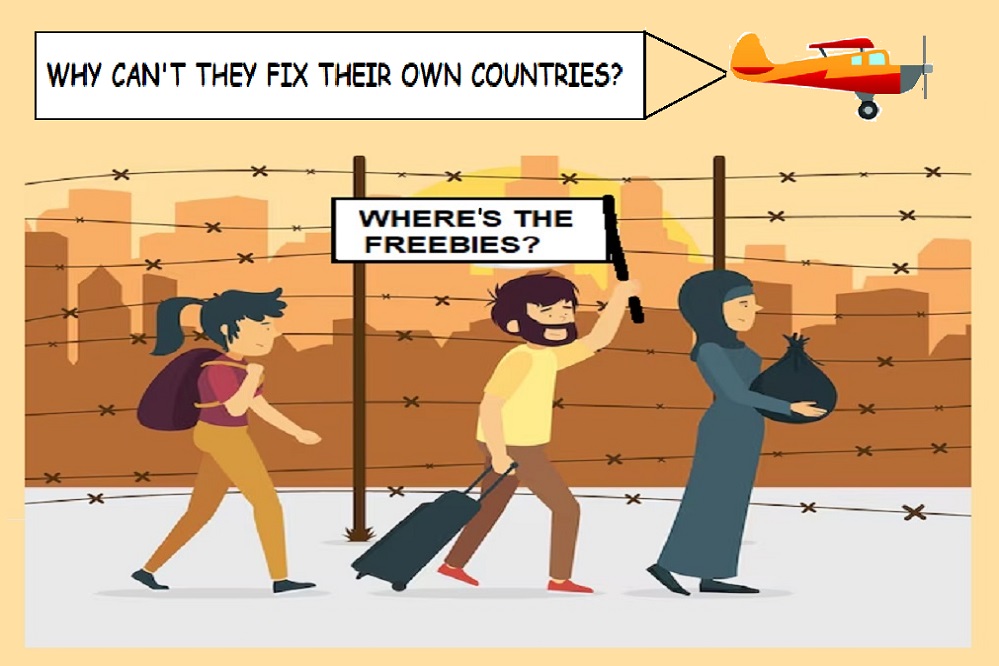Why are we not helping other countries fix their problems, preserve their cultures, and build their own American dreams? Instead, the U.S. has become a destination where immigrants are increasingly seen as a solution to political agendas rather than part of a broader effort to help their native countries thrive. As the U.S. continues to absorb immigrants into sanctuary cities, critics argue that these policies may be driven by globalist-backed interests seeking to weaken national identities, exploit vulnerable populations, and undermine the fabric of American democracy.
Sanctuary cities have become a point of contention, with proponents claiming they provide necessary protection for immigrants, while critics see them as a backdoor method to import voters and disrupt national security. What is often overlooked in this debate is the question of why the United States isn’t focusing on improving conditions in the immigrants’ home countries. Instead of pouring resources into managing the flow of migrants, America could be channeling its power, money, and influence into helping nations repair their own systems, preserve their cultures, and ensure their citizens can build their own version of the American Dream.
The Sanctuary City Debate
Sanctuary cities are defined as cities that limit cooperation with federal immigration authorities, making them a safe haven for undocumented immigrants. The policies behind these cities have been a source of deep political division in the U.S., particularly in the context of national security, immigration reform, and local versus federal jurisdiction. While sanctuary cities are supported by many Democrats who view them as essential for protecting immigrants, especially those fleeing violence or persecution, critics argue that they allow criminal elements to thrive unchecked.
The debate around sanctuary cities often revolves around the concern that they may harbor not just innocent people, but also criminal organizations, such as drug cartels, human traffickers, and even foreign operatives. There have been accusations that the policies effectively provide cover for these groups, making it easier for them to operate in urban areas with fewer questions asked.
National Security Risks: Allegations and Concerns
One of the most heated aspects of the sanctuary city debate is the claim that these cities may be harboring dangerous individuals. Critics assert that sanctuary cities provide cover for Chinese spies, terrorists, and drug cartels, who could infiltrate U.S. soil under the guise of immigration reform. The absence of strong immigration controls has made it easier for individuals with criminal intentions to enter the U.S.
Some argue that the reluctance to enforce federal immigration laws in sanctuary cities is an open invitation for exploitation, whether it be through drug trafficking or espionage.
Moreover, the recent surge in illegal border crossings and the growing political influence of immigrant populations in certain states have raised fears that sanctuary city policies could be leveraged to create a larger voting bloc sympathetic to the Globalists and Democratic Parties political agendas. Some have argued that these policies benefit Democrats by expanding their base among immigrant communities, while others suggest that the Globalist elite is pulling the strings behind the scenes.
The Role of the Democratic Party in the Sanctuary City Debate
The Democratic Party has long been a staunch advocate of sanctuary city policies, with the argument that they protect vulnerable populations from unjust deportation and foster inclusivity. However, this support has led to accusations from critics that the party is not only prioritizing the protection of undocumented immigrants but also creating a political advantage by expanding its voter base through these policies.
Some claim that the Democratic Party’s support for sanctuary cities is part of a broader globalist agenda that seeks to weaken national borders and undermine sovereign states. By promoting open immigration and a shift toward more collectivist policies, globalist forces may be working to erode national identities and promote a world without borders—where global cooperation supersedes national sovereignty. Critics argue that this undermines the very essence of the American experiment, which was built on the principles of self-determination, limited government, and individual freedom.
The Globalist Influence: A Strategy to Weaken National Identity
The growing influence of globalist interests in shaping U.S. immigration policy has raised concerns among many. Globalists, they argue, seek to flood America with immigrants in order to undermine national cultures and identities, replacing them with a homogeneous, globalized society. This agenda, according to critics, is being pushed by a coalition of powerful elites who benefit from open borders, cheap labor, and the erosion of cultural uniqueness.
The central question raised here is: why is the U.S. not working to help other countries repair their own systems and build the foundation for a better future? Why are we not helping these nations preserve their cultures and create opportunities for their citizens to live prosperous lives within their own borders? Instead of importing immigrants to America, critics suggest the U.S. should use its power and resources to support democratic reforms and economic development in struggling nations, helping them build their own “American Dreams.”
America has the financial power and political leverage to influence global affairs, including the possibility of shifting trade deals away from oppressive regimes and dictatorships, and supporting democratic governments that align with American values. Furthermore, it is essential to acknowledge the role of religion in shaping these countries. Critics argue that the absence of the basic Christian principles—love for neighbor and respect for a higher power—has been a major factor in many nations’ inability to achieve success. These values formed the foundation of America’s Constitution and democracy, and critics believe that spreading these ideas could help uplift struggling nations.
Sanctuary Cities: A Misguided Solution
Sanctuary cities, according to this line of reasoning, are not a solution to the immigration crisis. Rather than addressing the root causes of mass migration—such as corruption, poor governance, and economic inequality in immigrants’ home countries—sanctuary cities enable these problems to persist. By failing to help fix these nations, the U.S. is enabling a cycle of dependency, turning migrants into welfare cases rather than partners in improving their own societies.
Sanctuary cities may be seen as a well-intentioned effort to provide shelter to the needy, but they ultimately fail to address the broader issue of national and global instability. Critics argue that the U.S. should focus on diplomatic and economic policies that encourage self-sufficiency and progress in these countries, rather than creating a political class of immigrants who are encouraged to rely on government assistance.
Proposals for Action: Should the Military Intervene?
Many have suggested bypassing state authority and using military force to remove harmful elements from sanctuary cities in order to protect America’s national security, given that immigration enforcement is a federal responsibility under existing legal frameworks.
Alternative proposals include focusing on stronger border security, eliminating sanctuary city policies, and investing in foreign aid initiatives aimed at stabilizing foreign governments. These strategies could address the root causes of migration and create conditions where both immigrants and their home countries can prosper.
Conclusion:
The sanctuary city debate reflects broader political struggles within the U.S., fueled by the growing influence of globalist interests, the expansion of immigrant populations in urban areas, and increasing political polarization over immigration policy.
Rather than relying on sanctuary cities as a short-term solution, the U.S. should pursue a long-term strategy aimed at helping other nations strengthen their economies and cultures by embracing a basic form of Christianity. Without a foundation built on the core principles of love for one’s neighbor and respect for a higher power—values that shaped the American Constitution—true democracy and prosperity can never be realized. These principles, which emphasize moral values, freedom of speech, and the rule of law, are essential for fostering self-reliance and strong, democratic societies.
This approach would encourage self-sufficiency and the adoption of a universal Christian moral framework, providing the foundation for democracy, freedom, and peace. Only then can true global peace and security be achieved, preserving national identities and empowering all nations to prosper independently. Such a strategy would not only benefit the U.S., but also lay the groundwork for a world where self-determination and freedom can thrive across the globe.



